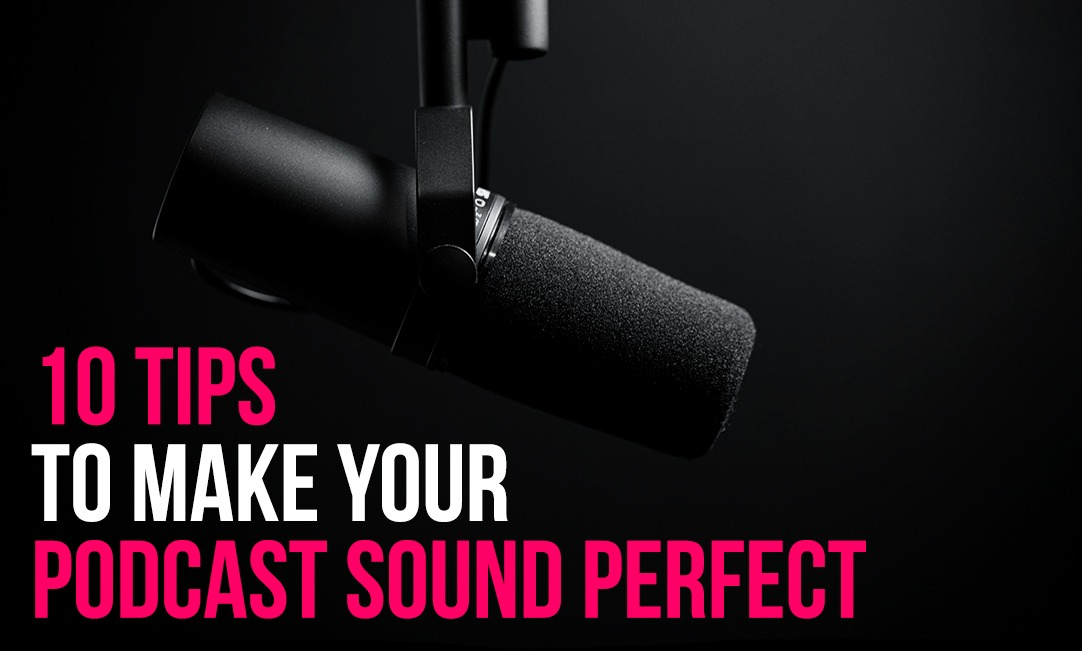10 Tips to Make Your Podcast Sound Perfect

Wondering how to make your podcast sound great?
Definitely, you have great content but still, you fail to gather loyal listeners. Ponder, why?
think realistically. Your sound quality may be one of the reasons. To be a successful podcaster, together with amazing content, your podcast must have amazing sound to make your listeners eagerly wait for a new episode. But high-quality audio doesn't just happen.
To produce a stand-out show, a lot happens behind the scene. Editing the sound quality have a lasting impact on your podcast. It brings out the differences between a great podcast and an amazing podcast. Though it's a time-consuming process, it requires your attention.
There are several podcast recording studio services that help you with the editing process. But if you wish to do it by yourself, ZOOM Recording Studio, a podcast studio in Los Angeles, brings for you a curated list of 10 useful tips that would help to make your podcast sound better. Try these and see the difference.
1. Make prior preparations
Though this has nothing to do with the actual editing process, it greatly influences getting high-quality professional-sounding audio for your podcast. Before starting your recording, pro editors recommend doing adequate preparation beforehand and do not leave anything for the last moment. This includes testing your setup, checking your audio levels, listening for any background sounds that can intervene in your audio track, etc. All these will help to make the editing process from intricate to easy.
2. Use the right equipment
While recording, you must use the right kind of equipment such as a great microphone. In addition, if you've got a good recorder, you've won half the battle. These ensure the production of a decent quality of the podcast.
3. Master your software
Now, it's time to get software that can work for you and master it. Initially, it may consume your time but will work in the long run! Your efforts would be paid whenever you'll sit down to edit and the improved audio you'll achieve.
4. Maintain a consistent distance from the microphone
It's general but a valuable tip. Whenever you're using a microphone, maintain a correct distance throughout the recording. Moreover, we have distracting plosive sounds such as 'P-Pops' and hyper-sibilant 'S' sounds. These cause an excessive burst of air on the microphone capsule and lead to undesirable effects. Much of these issues can be corrected during editing.
5. Sound natural
While recording your podcast, try to speak naturally. Don't sound artificial. Speak as if you're having a conversation with your audience. This ensures consistency of your voice and tone and enhances the overall quality of the podcast.
6. Record in a controlled environment
Our sound editors advise you to record for a podcast by podcast recording studios services in some professional studio but anyway if you want it to be done in your place, do it in a controlled environment. Find a quiet room far from the distracting sounds. Keep the windows closed to avoid any noise creeping into your room. Make sure the room is carpeted and the windows have curtains. These absorb echoes and give you an enhanced sound quality. If possible, choose a time of day when the place is quiet. These will save editing time.
7. Remove all undesirable things from your recording
To be perfect is near to impossible. So, whenever you're recording a podcast, there are always unnecessary and extra sounds such as breathing sounds, tongue noise, clutter, etc. We also use 'filler' sounds such as 'um', 'uh', 'yeah', etc. In excess, these sounds cause undesirable effects and must be removed during editing.
8. Edit in moderation for greater effect
This is important. Don't try to overdo the editing part. It is usually done by those who are new in the industry. While using your software, don't do everything that it offers and make things complicated. Use your software skills in moderation and at relevant places. So, over-editing kills the natural quality of the sound and makes the whole podcast artificial.
9. During interviews, use separate mics for individuals
If you're conducting an interview, never share the microphone with the participants. Use different microphones for individuals for enhanced sound quality. If you and your guest use the same mic, you both will have to continuously lean in and out to speak. This leads to different volume levels and sometimes the conversation ends up being inaudible. So, say no to mic sharing.
10. Get user-friendly software to record remote interviews
It often happens that there is a need to record the interviews when you and your guest are at distant places. In such cases, specific software accomplishes your task successfully. There is software that is user-friendly as well as can capture high-quality audio remotely. Our expert editors also recommend using a similar microphone for getting the same audio sound. This makes your editing process much easier.
Conclusion
These few tips could help you get a successful podcast. ZOOM Recording Studio is a professional podcast recording studio services provider and is a well-equipped studio with the latest tools and experienced and talented editors and sound engineers. If you want professional editing of your podcast episodes, our podcast recording studio in Los Angeles is a one-stop-destination. For more details, contact us.